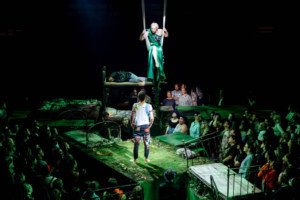Review: A MIDSUMMER NIGHT'S DREAM, Bridge Theatre

![]() Right in time for Pride month, Nicholas Hytner draws a curious card from his sleeve, interpreting A Midsummer Night's Dream as a beguiling exploration of identity.
Right in time for Pride month, Nicholas Hytner draws a curious card from his sleeve, interpreting A Midsummer Night's Dream as a beguiling exploration of identity.
He takes the methodical concept of last year's superb production of Julius Caesar and thrusts it upon Shakespeare's Dream, presenting it as an immersive piece. He structures the auditorium like his previous success, going for a standing pit and galleries all around, which create quite different audience experiences that hold a magical vibe nonetheless.
Hytner mildly updates the text, shuffling the roles and sprinkling pop culture references generously to make the humour easily relatable for a 21st-century audience. This is the strength of the show: it's aware it's a comedy and takes pride in being bonkers about it. It's over-the-top and honoured to be so, a joyous swarm of colour that begs not to be taken too seriously.
Hytner does nothing revolutionary with the world of Dream, but delivers a dazzling take on the famous 1605 tale of fairies who meddle with humans. Designer Bunny Christie gives the theatre a grassy vibe: platforms covered in green turf appear and disappear while beds wrapped with ivy and mattresses support the dreamlike status of the play.
The leitmotif is reinforced by the awe-inducing use of aerial silks and acrobatics throughout, accompanied by charming sound and lighting design by Paul Arditti and Bruno Poet, respectively. The company is a compact and charismatic ensemble led by Hytner's regular Oliver Chris as Theseus/Oberon and Gwendoline Christie as a Hippolyta/Titania.
The star power brought on by the two comes second place to the stunning work they do as the couples. Christie is as statuesque and grandiose as Theseus's wife as she is captivating as Titania. The major change in the material has the guise of Chris's Oberon, who falls desperately in love with the transformed Bottom.
Chris and Hammed Animashaun are adorably hilarious as the odd couple, reaching their apotheosis with an uproarious bathtub scene. Animashaun is the diamond in a sea of gemstones. His comedic timing and physical delivery turn him into a magnetic Bottom, culminating with a laugh-out-loud death of Pyramus aided by his Rude Mechanicals.
The fairies are a playful bunch of glitter-covered circus athletes; they hang from their silks and swing from poster beds, playing into the visions of the dream. David Moorst kicks off the trouble within the lovers as a lightly animalistic and hyperactive northern Puck, delighting the audiences with the character's funny asides and modern ad-libs.
Hytner toys with gender and sexuality, disregarding many preconceived notions and turning his Dream into a playful celebration of sexual fluidity and nature. Sexual liberation is key, whether it's via the lovers' catfight or the King of the Fairies.
Albeit an enchanting production, the promenade element of the play isn't fully convincing. We reviewed it from a seat on the first row of Gallery 1, from where the full picture was spellbinding, but one is aware that the reception would probably feel very distinct from the standing pit.
Essentially, there aren't any strong reasons for the audience to be part of the show like there were for Julius Caesar. The standing people do, however, add an interesting visual element for those sitting on the edges, and the fact that they're right in the midst of the action presumably turns the piece into a fascinating adventure for them.
A Midsummer Night's Dream runs at Bridge Theatre until 31 August.
Photo credit: Manuel Harlan
Reader Reviews
Videos

